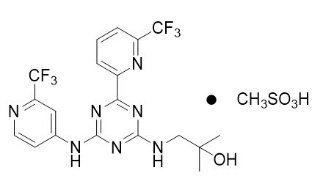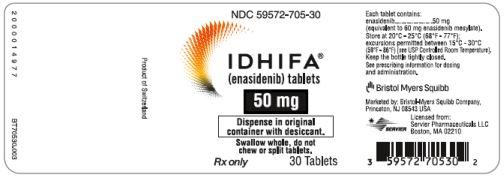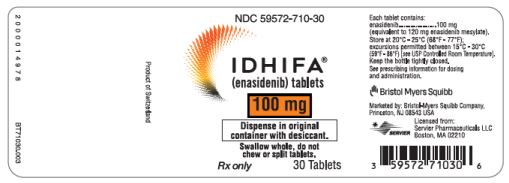Idhifa
Generic name: enasidenib
Drug class: Miscellaneous antineoplastics
y reviewed by A Ras MD.
What is Idhifa?
Idhifa is a prescription medicine used to treat people with acute myeloid leukemia (AML) with an isocitrate dehydrogenase-2 (IDH2) mutation whose disease has come back or has not improved after previous treatment(s). It is not known if Idhifa is safe and effective in children.
Description
Enasidenib is an inhibitor of isocitrate dehydrogenase-2 (IDH2) enzyme. Enasidenib is available as the mesylate salt with the chemical name:
2-methyl-1-[(4-[6-(trifluoromethyl)pyridin-2-yl]-6-{[2-(trifluoromethyl)pyridin-4-yl]amino}-1,3,5-triazin-2-yl)amino]propan-2-ol methanesulfonate.
Or
2-Propanol, 2-methyl-1-[[4-[6-(trifluoromethyl)-2-pyridinyl]-6-[[2-(trifluoromethyl)-4-pyridinyl]amino-1,3,5-triazin-2-yl]amino]-, methanesulfonate (1:1).
The chemical structure is:

The empirical formula is C19H17F6N7O ∙ CH3SO3H (C20H21F6N7O4S), and the molecular weight is 569.48 g/mol. Enasidenib is practically insoluble (solubility ≤74 mcg/mL) in aqueous solutions across physiological pH range (pH 1.2 and 7.4).
IDHIFA (enasidenib) is available as a 50-mg tablet (equivalent to 60 mg enasidenib mesylate) and a 100-mg tablet (equivalent to 120 mg enasidenib mesylate) for oral administration. Each tablet contains inactive ingredients of colloidal silicon dioxide, hydroxypropyl cellulose, hypromellose acetate succinate, iron oxide yellow, magnesium stearate, microcrystalline cellulose, polyethylene glycol, polyvinyl alcohol, sodium lauryl sulfate, sodium starch glycolate, talc, and titanium dioxide.
Mechanism of Action
Enasidenib is a small molecule inhibitor of the isocitrate dehydrogenase 2 (IDH2) enzyme. Enasidenib targets the mutant IDH2 variants R140Q, R172S, and R172K at approximately 40-fold lower concentrations than the wild-type enzyme in vitro. Inhibition of the mutant IDH2 enzyme by enasidenib led to decreased 2-hydroxyglutarate (2-HG) levels and induced myeloid differentiation in vitro and in vivo in mouse xenograft models of IDH2 mutated AML. In blood samples from patients with AML with mutated IDH2, enasidenib decreased 2-HG levels, reduced blast counts and increased percentages of mature myeloid cells.
What is the most important information I should know about Idhifa?
Idhifa may cause serious side effects, including:
- Differentiation Syndrome. Differentiation syndrome is a condition that affects your blood cells which may be life-threatening or lead to death if not treated. Differentiation syndrome has happened within 1 day and up to 5 months after starting Idhifa. Call your healthcare provider or go to the nearest hospital emergency room right away if you develop any of the following symptoms of differentiation syndrome while taking Idhifa:
- fever
- cough
- shortness of breath
- swelling of arms and legs
- swelling around neck, groin, or underarm area
- fast weight gain (greater than 10 pounds within a week)
- bone pain
If you develop any of these symptoms of differentiation syndrome, your healthcare provider may start you on a medicine taken by mouth or given through a vein (intravenous) called corticosteroids and may monitor you in the hospital.
What should I tell my healthcare provider before taking Idhifa?
Before taking Idhifa, tell your healthcare provider about all of your medical conditions, including if you:
- Are pregnant or plan to become pregnant. Idhifa can cause harm to your unborn baby if taken during pregnancy.
- If you are able to become pregnant, your healthcare provider will do a pregnancy test before you start taking IDHIFA.
- Females who are able to become pregnant and who take Idhifa should use effective birth control (contraception) during treatment with Idhifa and for at least 2 months after your last dose of Idhifa.
- Males who have female partners that are able to become pregnant should use effective birth control during treatment with Idhifa and for at least 2 months after your last dose of Idhifa.
- Idhifa may affect how hormonal contraceptives work and may cause them to not work as well.
- Talk to your healthcare provider about birth control methods that may be right for you while taking Idhifa.
- Idhifa may cause fertility problems in females and males, which may affect your ability to have children. Talk to your healthcare provider if you have concerns about fertility.
- Are breastfeeding or plan to breastfeed. It is not known if Idhifa passes into your breast milk. You should not breastfeed during your treatment with Idhifa and for at least 2 months after your last dose of Idhifa.
Tell your healthcare provider about all the medicines you take, including prescription and over-the-counter medicines, vitamins, and herbal supplements.
How should I take Idhifa?
- Take Idhifa exactly as your healthcare provider tells you to.
- Take Idhifa 1 time a day at the same time each day.
- Swallow Idhifa tablets whole. Do not chew or split the tablet.
- Swallow Idhifa with 8 ounces (one cup) of water.
- Idhifa can be taken with or without food.
- If you miss a dose of Idhifa or vomit after taking a dose of Idhifa, take the dose of Idhifa as soon as possible on the same day. Then take your next dose the next day at your regularly scheduled time. Do not take 2 doses at the same time to make up for the missed dose.
- Your healthcare provider should do blood tests to check your blood counts before you start Idhifa treatment and at a minimum of every 2 weeks for at least the first 3 months during treatment to check for side effects.
What are the possible side effects of Idhifa?
Idhifa may cause serious side effects, including:
See “What is the most important information I should know about Idhifa?”
The most common side effects of Idhifa include:
- nausea
- vomiting
- diarrhea
- jaundice
- decreased appetite
Tell your healthcare provider if you have any changes to the color of your skin or the whites of your eyes.
Your healthcare provider will monitor you for side effects during treatment and may tell you to stop taking Idhifa if you develop certain side effects.
These are not all the possible side effects of Idhifa.
Call your doctor for medical advice about side effects. You may report side effects to FDA at 1-800-FDA-1088.
General information about the safe and effective use of Idhifa
Medicines are sometimes prescribed for purposes other than those listed in a Medication Guide. Do not take Idhifa for conditions for which it was not prescribed. Do not give Idhifa to other people, even if they have the same symptoms you have. It may harm them. You can ask your pharmacist or healthcare provider for information about Idhifa that is written for health professionals.
How should I store Idhifa?
- Store Idhifa at room temperature from 68°F to 77°F (20°C to 25°C).
- Keep Idhifa in the original container.
- Keep the container tightly closed with desiccant canister inside to protect the tablets from moisture.
Keep Idhifa and all medicines out of the reach of children.
What are the ingredients in Idhifa?
Active ingredient: enasidenib
Inactive ingredients: colloidal silicon dioxide, hydroxypropyl cellulose, hypromellose acetate succinate, iron oxide yellow, magnesium stearate, microcrystalline cellulose, polyethylene glycol, polyvinyl alcohol, sodium lauryl sulfate, sodium starch glycolate, talc, and titanium dioxide
Label
PRINCIPAL DISPLAY PANEL – 50 MG TABLET BOTTLE LABEL
- NDC 59572-705-30
- IDHIFA®
(enasidenib) tablets - 50 mg
- Dispense in original
container with desiccant. - Swallow whole, do not
chew or split tablets. - Rx only
30 Tablets


PRINCIPAL DISPLAY PANEL – 100 MG TABLET BOTTLE LABEL
- NDC 59572-710-30
- IDHIFA®
(enasidenib) tablets - 100 mg
- Dispense in original
container with desiccant. - Swallow whole, do not
chew or split tablets. - Rx only
30 Tablets

